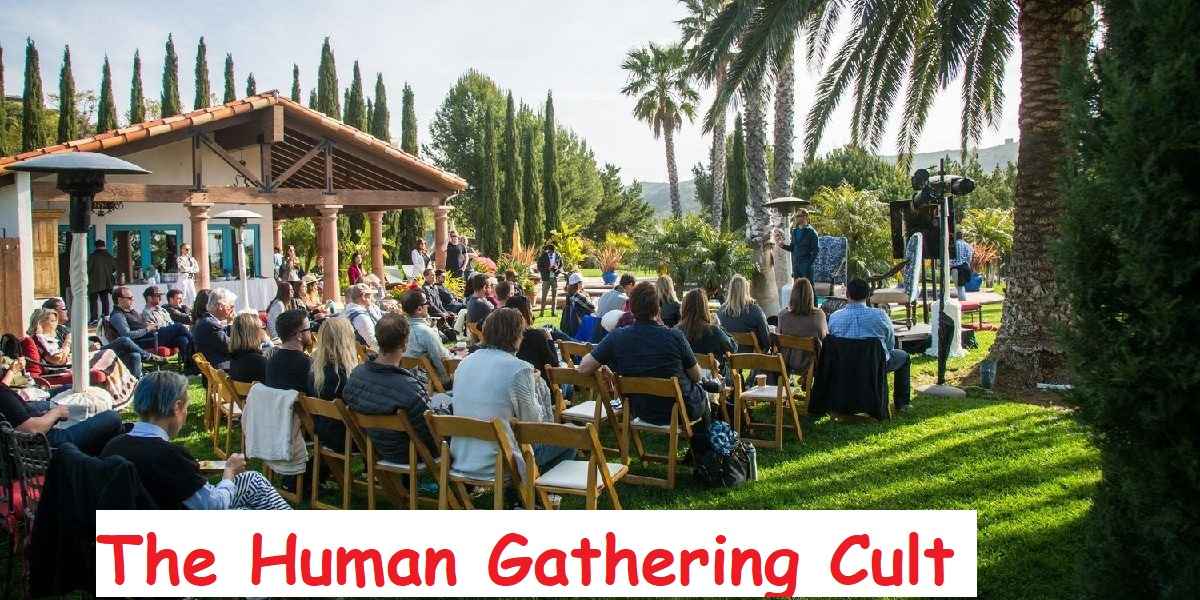Introduction
The term “cult” often evokes images of secretive societies, charismatic leaders, and extreme ideologies. While some cults are widely recognized for their controversial practices and manipulative tactics, the concept of a “human gathering cult” extends beyond traditional definitions to explore the complexities of group dynamics, social influence, and the quest for belonging. This article delves into the phenomenon of human gathering cults, examining the underlying factors, characteristics, and implications that shape our understanding of these enigmatic communities.
Defining the Human Gathering Cult
What Constitutes a Cult?
A cult can be broadly defined as a group or community characterized by devotion to a particular ideology, belief system, or charismatic leader, often exhibiting manipulative or controlling behaviors that exert undue influence over members’ thoughts, emotions, and behaviors.
The Evolution of Cult Dynamics
Human gathering cults represent a modern manifestation of cult-like dynamics within social gatherings, community groups, or organizations that exert significant influence over members’ beliefs, behaviors, and identities. These gatherings may not fit traditional definitions of a cult but exhibit similar characteristics of group conformity, charismatic leadership, and social control.
Read More: Is the Human Gathering Fake?
Characteristics of Human Gathering Cults
Charismatic Leadership
Charismatic leaders often play a pivotal role in human gathering cults, wielding influence through persuasive communication, captivating storytelling, and a compelling vision that resonates with members’ desires for purpose, belonging, and fulfillment.
Group Conformity and Social Control
Human gathering cults may foster an environment of conformity, where members are encouraged or coerced into adopting specific beliefs, behaviors, or practices that align with the group’s ideology. This can manifest through peer pressure, social rewards, or the manipulation of group dynamics to suppress dissent and maintain control.
Emotional Manipulation and Dependency
Human gathering cults may employ tactics of emotional manipulation, such as love bombing, gaslighting, or the exploitation of members’ vulnerabilities, to foster emotional dependency and allegiance to the group. These tactics can create a cycle of dependence that undermines members’ autonomy and critical thinking.
The Quest for Belonging and Identity
Psychological Needs and Motivations
The allure of human gathering cults often lies in their ability to fulfill fundamental psychological needs for belonging, identity, and significance. Members may be drawn to these communities in search of purpose, meaning, or a sense of belonging that transcends their individual identity.
Vulnerabilities and Recruitment
Human gathering cults may target individuals who are vulnerable to manipulation due to factors such as loneliness, insecurity, or a desire for belonging. Recruitment strategies often involve creating a sense of urgency, exclusivity, or a shared mission that resonates with potential members’ desires and aspirations.
The Impact of Human Gathering Cults
Psychological and Emotional Consequences
Involvement in a human gathering cult can have profound psychological and emotional consequences for members, ranging from cognitive dissonance and identity confusion to feelings of betrayal, isolation, and loss of autonomy. The manipulation of beliefs, behaviors, and social connections within the group can erode members’ self-esteem, critical thinking skills, and emotional well-being.
Societal Implications and Ethical Considerations
The presence of human gathering cults within society raises important ethical considerations and questions about the balance between individual freedom, group dynamics, and social responsibility. Addressing the complex interplay of belief systems, social influences, and ethical boundaries is essential for fostering a society that values autonomy, critical thinking, and informed consent.
Read More: Is The Human Gathering Real Exploring Authenticity in the Digital Age
The Influence of Technology and Social Media
Online Cults and Digital Communities
The advent of technology has transformed the landscape of cults, giving an upward push to online groups and digital cults. Social media structures and online forums offer fertile ground for cult recruitment, radicalization, and indoctrination.
Echo Chambers and Information Bubbles
Social media algorithms create echo chambers and record bubbles, reinforcing present beliefs and isolating individuals from numerous perspectives. This phenomenon can exacerbate group polarization and radicalization within on-line cults.
Digital Disconnection and Depersonalization
While era facilitates connectivity, it may additionally cause virtual disconnection and depersonalization. Online cults may also make the most of this virtual anonymity to control and control members without face-to-face interaction, further blurring the lines among reality and vitality.
Cults in Society: Impact and Implications
Psychological Harm and Trauma
In intense cases, cult involvement can bring about mental harm, trauma, and even lack of life. Manipulative leaders might also make the most of their followers for financial gain, sexual exploitation, or ideological extremism, leaving lasting mental scars on survivors.
Legal and Ethical Concerns
Cults improve complex legal and ethical issues regarding freedom of notion, man or woman autonomy, and the rights of individuals. Balancing spiritual freedom with the safety of vulnerable people poses tremendous challenges for policymakers, law enforcement agencies, and intellectual health professionals.
Societal Resilience and Prevention
Building societal resilience towards cults requires a multifaceted method that addresses social, mental, and educational elements. Public focus campaigns, psychological help offerings, and regulatory measures can mitigate the effect on cults and empower individuals to make informed choices.
Emerging Trends and Future Directions
Technological Evolution and Cult Adaptation
As the era continues to adapt, cults adapt their recruitment and indoctrination procedures to exploit digital platforms and communication gear. AI-powered algorithms may additionally allow cults to target vulnerable people more efficiently and customize persuasive messaging based totally on consumer statistics.
Globalization and Cross-Cultural Cults
The globalization of conversation networks and travel has facilitated the spread of cults across geographical and cultural barriers. Cults may also take advantage of cultural variety to recruit members from numerous backgrounds and adapt their notion systems to resonate with local ideologies.
Psychological Resilience and Empowerment
Empowering individuals with important questioning abilities and psychological resilience is crucial for countering the effect of cults. Educational applications, mental fitness aid services, and network-based total interventions can equip individuals with the tools to apprehend and face up to coercive persuasion procedures.
Ethical Considerations and Human Rights
Cults and Human Rights Violations
In cases in which cults engage in coercive practices or violate fundamental human rights, intervention may be vital to shield people from damage. However, interventions have to stabilize the rights of individuals to freedom of belief and affiliation with the obligation of the state to shield public protection and welfare.
Freedom of Religion and Belief
Respecting freedom of religion and perception is an essential principle of human rights. While cults may additionally preserve unconventional ideals or practices, individuals have the right to keep and express their beliefs as long as they no longer infringe upon the rights of others or engage in dangerous behaviors.
Legal Protections and Safeguards
Legal frameworks need to provide adequate protections and safeguards in opposition to exploitation and abuse inside cults. Laws regulating religious organizations, consumer safety, and mental fitness services play a vital position in safeguarding the rights and welfare of individuals worried in cults.
Conclusion
The phenomenon of human gathering cults offers a fascinating yet sobering glimpse into the complexities of human behavior, social influence, and the quest for belonging. By understanding the underlying factors, characteristics, and implications of these enigmatic communities, we can foster awareness, promote critical thinking, and cultivate environments that empower individuals to engage authentically, ethically, and autonomously within society.
FAQs: Understanding Human Gathering Cults
1. What distinguishes a human gathering cult from other social groups or organizations?
A human gathering cult is characterized by a combination of charismatic leadership, group conformity, emotional manipulation, and a compelling ideology or belief system that exerts significant influence over members’ thoughts, behaviors, and identities. Unlike other social groups or organizations, cults often exhibit manipulative tactics, control mechanisms, and a heightened emphasis on loyalty and obedience to the group’s leadership or ideology.
2. How do individuals become involved in human gathering cults?
Individuals may become involved in human gathering cults through various recruitment strategies that exploit psychological vulnerabilities, such as a desire for belonging, identity, or purpose. Recruitment tactics often involve creating a sense of urgency, exclusivity, or a shared mission that resonates with potential members’ aspirations, beliefs, or values.
3. What are the psychological and emotional consequences of involvement in a human gathering cult?
Involvement in a human gathering cult can have profound psychological and emotional consequences, including cognitive dissonance, identity confusion, emotional dependency, and a loss of autonomy. Members may experience feelings of betrayal, isolation, or disillusionment as they grapple with the manipulation of beliefs, behaviors, and social connections within the group.
4. How can individuals identify and protect themselves from potential human gathering cults?
Awareness, critical thinking, and informed consent are essential tools for identifying and protecting oneself from potential human gathering cults. Red flags may include charismatic leaders who exhibit controlling behaviors, group dynamics that suppress dissent or individual autonomy, and recruitment tactics that exploit vulnerabilities or create a sense of dependency. Seeking diverse perspectives, fostering autonomy, and maintaining open communication can help individuals navigate the complexities of group dynamics and make informed decisions about their involvement in social gatherings or organizations.
5. What ethical considerations surround the phenomenon of human gathering cults?
The presence of human gathering cults within society raises important ethical considerations regarding individual freedom, group dynamics, informed consent, and social responsibility. Balancing the rights and autonomy of individuals with the potential risks of group influence, manipulation, and coercion is essential for fostering a society that values ethical conduct, critical thinking, and respectful relationships.
6. Can people leave cults once they join?
Leaving a cult can be a challenging and complex process, often fraught with psychological, social, and logistical obstacles. Cults may employ tactics such as guilt-tripping, shunning, or threats of punishment to discourage members from leaving. Additionally, individuals may face difficulties reintegrating into mainstream society, rebuilding social networks, and overcoming psychological indoctrination. However, with appropriate support and resources, many people successfully exit cults and reclaim their autonomy.
Read More: Is The Human Gathering Worth It? Evaluating the Value of Attending a Leadership Conference


